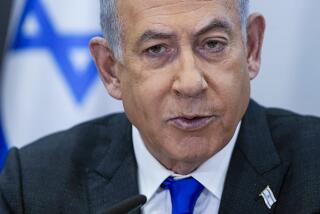Hong Kong Lawmakers Invited to Visit Mainland
- Share via
BEIJING — After years of treating pro-democracy legislators in Hong Kong as a collective thorn in its side, the Chinese government is adopting a new strategy: inviting them to lunch.
All 60 members of the Hong Kong legislature, including 25 democracy advocates, have been invited to the neighboring province of Guangdong for a two-day visit starting Sunday.
The trip, a fairly predictable itinerary of factories, provincial offices, special economic zones and banquets, may itself be “a nonevent,” said Ronnie Tong, a pro-reform legislator. “The fact that all 60 members have been invited and are receiving official recognition is the real breakthrough,” he said.
Most, if not all, of the lawmakers are expected to take China up on its offer. They include Martin Lee, former head of the opposition Democratic Party, and 11 other pro-democracy lawmakers, who are barred from entering China for participating in demonstrations in Hong Kong supporting the 1989 protests at Beijing’s Tiananmen Square.
Also along for the ride will be firebrand legislator Leung “Longhair” Kwok-hung, famous for his protests and Che Guevara T-shirts. Leung said he was not ruling out one of his signature outbursts during the trip.
For years, China’s policy has been to isolate and contain Hong Kong’s pro-democracy movement. In 2003, Beijing got a huge shock when half a million Hong Kong residents took to the streets in a call for greater self-determination. Since then, the central government has adopted a more nuanced approach, replacing Hong Kong’s loyal but flat-footed chief executive, Tung Chee-hwa, with the more politically astute, British-trained Donald Tsang.
Some observers see the trip as evidence of an increasingly sophisticated divide-and-conquer strategy under which Beijing employs economic incentives, cultural relics, celebrities and tourism to appeal to Hong Kong’s self-interest and blunt political aspirations. Through this invitation, they believe, China is making a calculated move to appear reasonable, even as democrats who initially urged a boycott appear churlish.
“Beijing has really put democrats on the defensive,” said Peter Cheung, a professor of political science at the University of Hong Kong. “They’ve had a hard time finding a unified strategy on this.”
Others say the offer reflects a genuine shift as China tries to engage and listen to Hong Kong democracy advocates for tactical reasons. The Communist Party has not suddenly become misty-eyed about democracy, they say. Rather, it sees Hong Kong as part of its survival strategy, a testing ground for handling growing unrest in China, and engineering a rapprochement with Taiwan.
“It seems that Hong Kong is being brought more and more into the orbit of mainland politics,” said Michael DeGolyer, a professor at Hong Kong Baptist University and head of a multiyear project analyzing political changes in the territory. “It may be a case of, ‘If you can’t beat them, join them.’ ”
Lawmakers going on the trip are not expected to meet with central government officials who handle broader issues such as when the former British colony will gain universal suffrage and in what form. Under the present system, Hong Kong’s chief executive is named by a pro-Beijing committee, and the legislature is elected through a complicated system that also favors Beijing.
Tsang, the chief executive, is expected in coming weeks to unveil proposals on how to make elections in 2007 and 2008 more democratic, although these probably will fall far short of a one-person, one-vote system.
Cross-border issues are likely to feature prominently in discussions with top Guangdong officials, including pollution and tainted food from southern China that increasingly concern Hong Kong residents.
The leadership in Beijing, meanwhile, will be watching carefully from the sidelines.
“If Hong Kong democrats don’t irritate the central government too much, things could go even further,” said Yin Hongbiao, a professor of international relations at Peking University.
“In the long term, the development of democracy in Hong Kong and Taiwan will influence the mainland, given its lack of experience with democracy,” Yin said. “The lessons from Hong Kong and Taiwan are more relevant to us than those of America or other countries.”
Yin Lijin in The Times’ Beijing Bureau contributed to this report.
More to Read
Sign up for Essential California
The most important California stories and recommendations in your inbox every morning.
You may occasionally receive promotional content from the Los Angeles Times.












